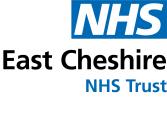East Cheshire NHS Trust is committed to improving the patient experience for people with learning disabilities and their carers.
A Learning Disabilities and Autism Group is in place in the Trust, there is representation on the group from the Rossendale Trust, David Lewis, and Cheshire and Wirral Partnership Trust.
If you would like more information, please contact: ecn-tr.patientexperience@nhs.net.
We are always keen to hear about your experiences so if you have recently accessed our services please spare five minutes to complete our quick feedback survey here.
The Trust understands that it can be a very worrying time for carers when someone with a learning disability comes into hospital. We want to ensure that you are involved as much as you want to be in the patient's care, bearing in mind their condition and their wishes.
At East Cheshire NHS Trust, we want to help people with learning disabilities to have a better understanding of their hospital stay, and their care and treatment wherever possible.
East Cheshire NHS Trust has signed up to the Mencap Get It Right Charter
A patient passport provides immediate and important information for doctors, nurses and administrative staff in an easy to read form, promoting a positive experience for people with learning disabilities going into hospital.
This page and its content is intended to provide patients with Learning Disabilities, and their families, with specific information around our hospital services in an easy to read format.
A risk assessment MUST be carried out for all patients with a learning disability who are admitted to hospital. This will enable staff to identify what reasonable adjustments can be made.
Working together is fundamental to high quality care provision particularly when meeting the challenges associated with supporting people with learning disabilities who have a history of poor quality health care provision and receive care and support from a wide range of carers ranging from families to paid carers.
Found a problem? Report it and help us to improve our website
